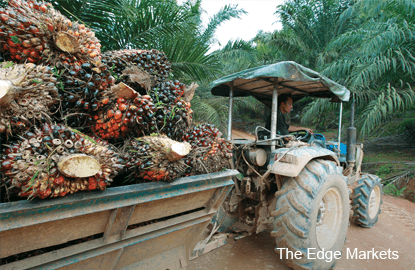
KUALA LUMPUR: The Roundtable on Sustainable Palm Oil (RSPO) is planning to finalise new voluntary add-ons to its principles and criteria (P&C) that will tighten the criteria for the cultivation of “high-carbon stocks” and raise the standards of sustainable production of palm oil.
This means its more than 2,000 member companies globally — which represent 40% of the global palm oil industry — that have obtained RSPO certification can choose to enhance it by adopting the new add-ons.
“We intend to have the voluntary add-ons probably before the end of the year,” RSPO secretary-general Datuk Darrel Webber told The Edge Financial Daily when met recently, adding that the high-carbon stocks cover forests and peatlands.
His announcement came after The Guardian reported in June that 16 companies, together with investors that represent some US$5 trillion (RM18.95 trillion) in assets under management, had banded together and sent a letter to the RSPO, urging it to enforce stricter standards to ensure sustainable production of palm oil.
Signatories included multinational heavyweights like PepsiCo, Walmart, Carrefour, Colgate-Palmolive, Procter & Gamble, Johnson & Johnson, and Starbucks.
The letter, available online, said there are current shortcomings of RSPO certification as it does not include protection for critical areas, such as high-carbon stock forests on peatlands, and does not give assurances that its standards are being complied with.
Environmentalists have argued that peatlands store twice the amount of carbon stored in the world’s total forest biomass, and any development on the lands releases massive amounts of greenhouse gases into the atmosphere.
According to the letter, many companies across the palm oil supply chain have voluntarily adopted their own sourcing standards that go beyond those set by the RSPO to ensure responsible and sustainable palm oil production. The Guardian noted that these include five of the top 10 corporate purchasers of palm oil, like Colgate-Palmolive and Johnson & Johnson.
The letter also stated that to wait for 2018, when the scheduled review of the RSPO’s P&C will be conducted, is “inconsistent” with the needs to address urgent deforestation, peatland conversion and a multitude of issues that they believe are associated with unsustainable palm oil production. Hence, the signatories urged the RSPO to conduct an accelerated review of the P&C and related documents.
Webber, who confirmed that the RSPO had received the letter, said it is unlikely that the RSPO will incorporate the voluntary add-ons into its core standards this year.
He said this is because the RSPO had reviewed its P&C in 2013, and the organisation is committed to evaluating and altering its P&C once in every five years.
“We will reply and tell them about our efforts to have these voluntary add-ons. But we also have to tell them that we are trying to find ways to make sure these additional criteria do not impede the implementation of the RSPO standards because [those] are still new,” he said.
“It (the 2013 P&C) is not even fully implemented yet because we just reviewed it in 2013, so we can’t immediately change it. We are dependent on our stakeholders, who will decide whether to change the core standards or not,” he said, adding that the new voluntary add-ons will have to be tested for efficacy, before they can be considered for adoption into the core standards.
He also said the cultivation of palm oil in extensive areas of peat is not encouraged under the RSPO’s current standards.
The RSPO is a non-profit association with stakeholders from the palm oil industry — palm oil producers, processors and traders, consumer goods manufacturers, retailers, banks and investors, environmental, social and developmental non-governmental organisations — which develop and implement global standards for sustainable palm oil that members are required to comply with.
Meanwhile, RSPO honorary member M R Chandran told The Edge Financial Daily that palm oil producing companies and consumer countries’ intention to move beyond the RSPO is due to demand from the market.
“Now, is this the right move? From the RSPO’s point of view, we want to make certified sustainable palm oil the norm for everyone, including smallholders, corporatives and even plasma scheme players,” he added.
Param Agricultural Soil Surveys (M) Sdn Bhd managing director Dr S Paramananthan, who is assisting the Malaysian Palm Oil Board in formulating policies for sustainable Malaysian palm oil concerning peat, contends there are different types of peat that may or may not be suitable for cultivation.
“The reality is that people have already planted on peat. Are you going to tell these smallholders to stop planting? Where are they going to get their livelihood?” he said.
Furthermore, he said there is good peat on which “we have done a paper published in an international journal to show that we can get economic viability and sustainable cultivation from”.
But he concurred that “there are certain kinds of peat that should not have been even cleared in the first place”.
As such, Paramananthan is mapping peatlands in Malaysia to identify areas suitable for oil palm cultivation.
Malaysia and Indonesia account for about 85% of global palm oil production. Malaysia produced some 19.6 million tonnes of crude palm oil last year, up 2.3% from 19.2 million tonnes in 2013.

This article first appeared in The Edge Financial Daily, on July 13, 2015.